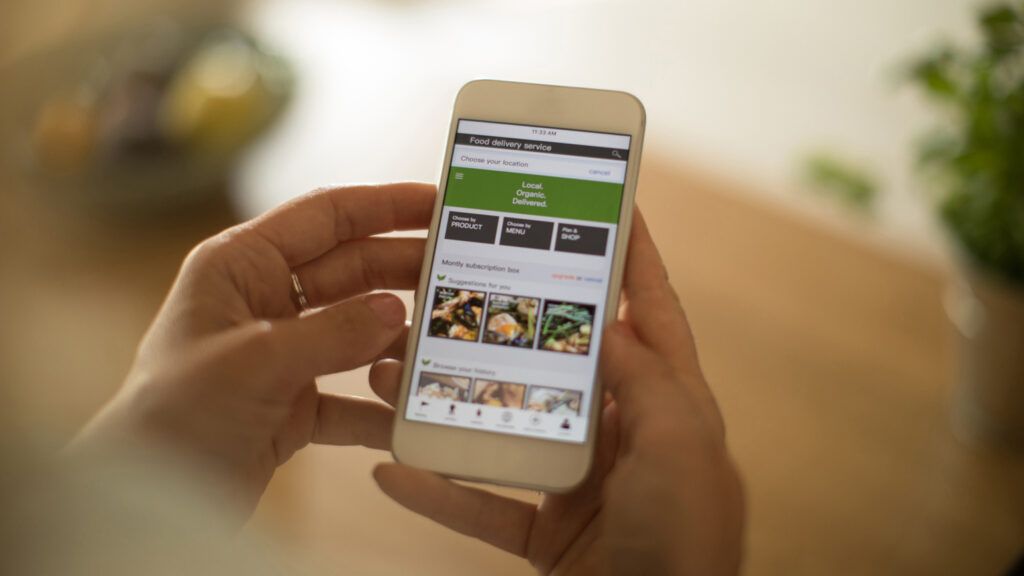Julie Hayes is the Content Manager at Benjamin Rose Institute on Aging.
The Covid-19 pandemic has required changes in almost every area of life, including daily tasks like shopping for items at grocery and convenience stores. Authorities have recommended social distancing and remaining at home as ways to “flatten the curve” and stay protected. Things that used to be simple now generally mean planning way ahead and taking extra precautions.
If you are a caregiver to an older loved one, or are assuming a larger role as a helper during this time, there is even more to keep in mind. It’s become challenging enough to shop for your own necessary items. Now, with your loved one considered to be in a particularly vulnerable category due to age, keeping him or her safe and well stocked with necessities can be even more time-consuming and stressful. This is especially true if he or she has also recently been diagnosed with Covid-19, and wants to continue on with regular shopping routines nonetheless. But there are good ways to make things more easy.
Food and necessary household items are, of course, vital. So, what are the safest and most manageable ways to access them, with the least risk to yourself, your loved one and other people?
Buying food and household supplies
· Shopping on the internet: A number of grocery stores and supermarkets allow you to order food and essential household items online and have them delivered for curbside pickup or directly to your home. You can also use apps like Instacart and Freshdirect which offer shopping and delivery services, either directly from them or from local retailers, such as grocery stores and pharmacies. Most of these services offer methods of no-contact delivery if you request it. You can place orders to your loved one’s address if he or she does not use the internet, or feel comfortable navigating these services without help.
Remember, though, that there is a high demand for these services at this time, so it may be difficult to arrange same-day delivery. It may be necessary to order several days in advance of when your loved one needs the items so that you can be sure they arrive on time. Another good tip is to preplan weekly meals together to determine what groceries are needed and when. Several services let you add or remove items to a placed order up until a few hours before it is delivered.
· Shopping safely in-person: You may have to shop in a store if you’re unable to track down an urgent item online because of increased demand. If so, you should take appropriate precautions. Many stores request that customers adhere to certain guidelines, such as keeping distance while in line or not touching items you aren’t committed to buying. Most stores have also cut down on the number of customers allowed inside at one time. If the store you are visiting has such rules, it is important to comply.
In order to protect yourself and others, you should also:
· Wear a mask.
· Wipe down the handle of the shopping cart with disinfectant wipes before and after use.
· Use a credit or debit card to make purchases. Doing so helps to limit physical contact with the cashier that would be needed to exchange bills and coins.
· Wear gloves. In order to avoid cross-contamination, make sure not to touch your face, phone or other items when you have them on. When you are done using the gloves, remove them as safely as possible. The Cleveland Clinic recommends the method shown in this video to remove gloves without risking contamination. If the gloves are disposable, throw them away after use. If they are cloth, wash them before you use them again.
· Allow your fellow shoppers to have space. Return to aisles when they are less crowded.
· Shop outside of peak hours, when you can.
After you’ve gotten food home, try not to set the bags down on surfaces where you will later be preparing or eating it. You should wash your hands for at least 20 seconds after unloading. According to the Food and Drug Administration, there is no current evidence to support the virus being transmitted through food packaging, but wiping down packaging and containers with disinfecting products certainly won’t hurt if it gives you peace of mind.
· Senior hours: Whenever possible, try to keep your loved one from going out to a store. If you’re unable to go for him or her, find out whether somebody else can do it.
If it is absolutely necessary for your older loved one to venture out to a store, have a discussion about the above precautions. You should also encourage your loved one to shop within designated senior hours to limit exposure to peak hour shoppers and to ensure better access to items before stocks are depleted.
· Find substitutes for unavailable items: There has been high demand for particular foods and household items. Draw up a shopping list with your loved one, and consider alternatives in case the ingredients you want are out of stock.
If you can’t find a household product at a store, you might be able to locate it online. But be aware that many people are selling in-demand items at unnecessarily high prices. Even though several online platforms are cracking down on this behavior, you should remain cautious.
If a product is especially difficult to locate make it a team effort and ask friends or family members to please buy it if they come across it when they’re shopping. If so, they can leave it at your loved one’s door for him or her to pick up.






